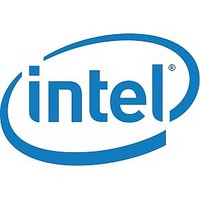NHE6300ESB S L7XJ Intel, NHE6300ESB S L7XJ Datasheet - Page 208

NHE6300ESB S L7XJ
Manufacturer Part Number
NHE6300ESB S L7XJ
Description
Manufacturer
Intel
Datasheet
1.NHE6300ESB_S_L7XJ.pdf
(848 pages)
Specifications of NHE6300ESB S L7XJ
Lead Free Status / RoHS Status
Compliant
- Current page: 208 of 848
- Download datasheet (9Mb)
5.17.4
Figure 20. USB Data Encoding
5.17.5
5.17.5.1 Bit Ordering
5.17.5.2 SYNC Field
5.17.5.3 Packet Field Formats
Intel
DS
208
®
6300ESB I/O Controller Hub
Data Encoding and Bit Stuffing
The USB employs NRZI data encoding (Non-Return to Zero Inverted) when transmitting
packets. In NRZI encoding, a 1 is represented by no change in level and a 0 is
represented by a change in level. A string of zeros causes the NRZI data to toggle each
bit time. A string of ones causes long periods with no transitions in the data. In order to
ensure adequate signal transitions, bit stuffing is employed by the transmitting device
when sending a packet on the USB. A zero is inserted after every six consecutive ones
in the data stream before the data is NRZI encoded to force a transition in the NRZI
data stream. This gives the receiver logic a data transition at least once every seven bit
times to ensure the data and clock lock. A waveform of the data encoding is shown in
Figure
Bit stuffing is enabled beginning with the Sync Pattern and throughout the entire
transmission. The data “one” that ends the Sync Pattern is counted as the first one in a
sequence. Bit stuffing is always enforced, without exception. When required by the bit
stuffing rules, a zero bit will be inserted even when it is the last bit before the end-of-
packet (EOP) signal.
Bus Protocol
Bits are sent out onto the bus least significant bit (LSb) first, followed by next LSb,
through to the most significant bit (MSb) last.
All packets begin with a synchronization (SYNC) field, which is a coded sequence that
generates a maximum edge transition density. The SYNC field appears on the bus as
IDLE followed by the binary string “KJKJKJKK,” in its NRZI encoding. It is used by the
input circuitry to align incoming data with the local clock and is defined to be eight bits
in length. SYNC serves only as a synchronization mechanism and is not shown in the
following packet diagrams. The last two bits in the SYNC field are a marker that is used
to identify the first bit of the PID. All subsequent bits in the packet must be indexed
from this point.
Field formats for the token, data, and handshake packets are described in the following
section. The effects of NRZI coding and bit stuffing have been removed for the sake of
clarity. All packets have distinct start and end of packet delimiters.
Bit Stuffed Data
NRZI Data
20.
CLOCK
Data
Order Number: 300641-004US
Intel
®
6300ESB ICH—5
November 2007
Related parts for NHE6300ESB S L7XJ
Image
Part Number
Description
Manufacturer
Datasheet
Request
R

Part Number:
Description:
Intel 6300ESB I/O Controller Hub
Manufacturer:
Intel Corporation
Datasheet:

Part Number:
Description:
Microprocessor: Intel Celeron M Processor 320 and Ultra Low Voltage Intel Celeron M Processor at 600MHz
Manufacturer:
Intel Corporation

Part Number:
Description:
Intel 82550 Fast Ethernet Multifunction PCI/CardBus Controller
Manufacturer:
Intel Corporation
Datasheet:

Part Number:
Description:
Intel StrataFlash memory 32 Mbit. Access speed 120 ns
Manufacturer:
Intel Corporation
Datasheet:

Part Number:
Description:
Intel StrataFlash memory 32 Mbit. Access speed 120 ns
Manufacturer:
Intel Corporation
Datasheet:

Part Number:
Description:
Intel StrataFlash memory 64 Mbit. Access speed 150 ns
Manufacturer:
Intel Corporation
Datasheet:

Part Number:
Description:
Intel StrataFlash memory 32 Mbit. Access speed 100 ns
Manufacturer:
Intel Corporation
Datasheet:

Part Number:
Description:
DA28F640J5A-1505 Volt Intel StrataFlash Memory
Manufacturer:
Intel Corporation
Datasheet:

Part Number:
Description:
5 Volt Intel StrataFlash?? Memory
Manufacturer:
Intel Corporation
Datasheet:

Part Number:
Description:
5 Volt Intel StrataFlash?? Memory
Manufacturer:
Intel Corporation

Part Number:
Description:
Intel 82801DB I/O Controller Hub (ICH4), Pb-Free SLI
Manufacturer:
Intel Corporation
Datasheet:

Part Number:
Description:
Intel 82801FB I/O Controller Hub (ICH6)
Manufacturer:
Intel Corporation
Datasheet:

Part Number:
Description:
Intel Strataflash Memory28F128J3 28F640J3 28F320J3
Manufacturer:
Intel Corporation
Datasheet:

Part Number:
Description:
Controllers, Intel 430TX PCIset: 82439TX System Controller (MTXC)
Manufacturer:
Intel Corporation










